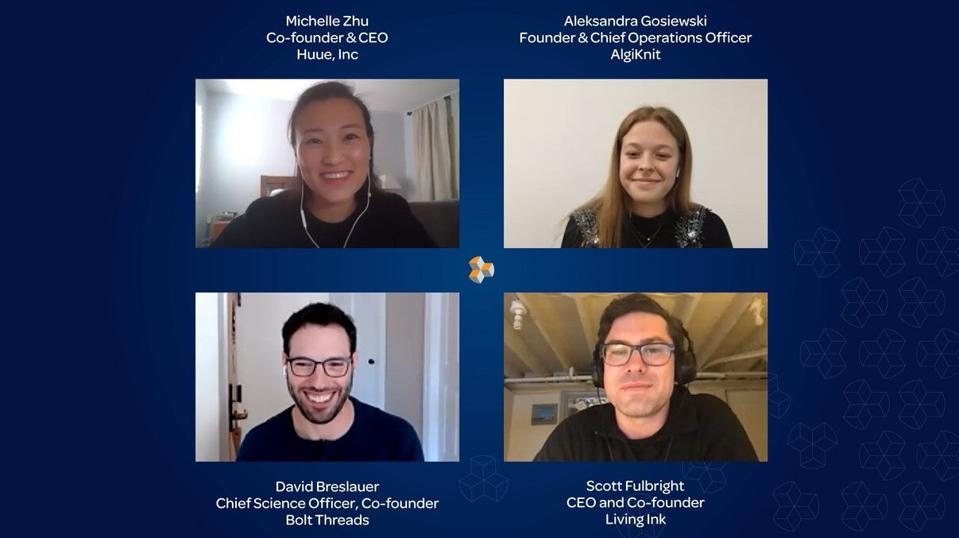Building Customer Awareness for the Next Biotech Startup: Lessons from Brands & Biology
Dec 13, 2020
How do you tell the story of clean meat, sustainable fashion, brewed buildings, carbon recyclables, consumer care, and skiing? At first glance, it’s not obvious how these products fit in the same narrative. But a closer look shows that the thread weaving them all together is biology, or at least it will be if these products can succeed as biotech innovations. At SynBioBeta’s Brands and Biology event, entrepreneurs and innovators gathered from across the synthetic biology space to debate and develop solutions to the challenge of bringing biotech to consumers.During the two-day virtual conference, current and future biotechnology leaders discussed the growing intersection of consumer branding and synthetic biology, and what it will take to appeal to new consumer bases. As emerging, disruptive biotech gains traction in consumer markets, how will companies and customers alike adapt to this new product space?
The Customer is Always Right
The event kicked off with a discussion introducing the biggest question facing the bio-economy— Consumer Biotechnology - Why Now?The conversation centered around major marketing shifts to focus more on the consumer rather than the technology. Massimo Portincaso (Boston Consulting Group) said companies must not only deliver a functional component for their customers, they must also offer a genuine emotional narrative and customer interaction. Alexander Lorestani (Geltor) agreed, even though his company is mostly focused on supplying B2B bio-designed proteins. “One of the first things I do when new Geltor products launch is to look at the product review,” says Lorestani. What consumers say about the end product matters at all levels of the supply chain.The speakers, which also included Mikah Coffindaffer (Procter & Gamble) stressed that companies cannot mishandle their new market opportunities. With the potential to disrupt current manufacturing processes for cosmetics, fashion, and more, the key to success depends on how companies manage public reception to synthetic biology.It’s clear that consumer biotech companies must reach out to their customers through effective communication, adequate technical education, and wide appeal of their products. Coffindaffer noted that, in P&G’s trials, the purity and efficacy of bio-based cosmetics excited both regulatory partners and consumers despite the complex science and higher price point. Portincaso also emphasized that companies must be thoughtful and tread carefully to succeed in the mass market: “We don’t want the same negative narrative that GMOs got,” he says. While it may take years for these innovations to become normalized for the general public, the synthetic biology industry needs to work together to build rapport and acceptability of new brands.
Speaking the same language
For years, the scientific community has been applauded for “creating conversations.” Yet, in a discussion about GMOs after her panel, Christina Agapakis (Ginkgo Bioworks) pointed out that for the average person, “ conversation around sticky problems until it’s in front of their face,” such as bright GMO labels at the grocery store. To date, biotech companies have made very little headway with consumers by focusing only on their science.Instead, biotech companies should also be creating brands.

When synthetic biology companies make brands, they learn to speak the same language as the consumers they’re trying to reach. A brand is a mission to identify with. Consumers can connect more strongly with brands that take pride in their technology and sustainability goals, including biotech backed by GMOs. Or, as Coffindaffer puts it, “Made by nature, perfected by science.” It’s not just a catchphrase. Coffindaffer adds that “bringing to life the tagline, the naming, and the visual space will be critical.”It’s all well and good to discuss lofty hopes for consumer relations to synthetic biology. But how is this future technically achieved? During Brands and Biology, three major themes emerged:
Transparency
Genuine companies are appreciated everywhere. When biotech companies talk about changing the genetic code of life, transparency is even more critical. It’s more than setting the bar for bioethics. Consumers are looking for—and lacking—transparency in science and Big Tech. The synthetic biology industry has a chance to fill that vacuum.One way to set the transparency standard is through product labeling. Companies should use the terminology that best fits their brand. But many speakers stressed that biotech companies using non-GMO labeling hinder progress and spread distrust in synthetic biology.
Understanding customers
For scientists, selling a product directly to consumers can be a bit of a culture shock. In many ways, the reason for this shock is simple: when customers make choices, there’s no guarantee that the ‘coolest’ technology will sell. Government and regulatory bodies are predictable; people are not. Focusing on how products can improve consumers’ lives is more important than the underlying enabling tech.

But above all, consumers want quality. Aleksandra Gosiewski (AlgiKnit) described balancing on the tightrope between synthetic biology and consumer goods: “We’re being upheld to the performance metrics of existing products,” Gosiewski says. To gain consumer trust, bio-based products must meet or exceed the efficacy and efficiency of current ingredients and materials.
Solving the right problems
The biggest question biotech entrepreneurs should take away is this: Is your product even solving the right problem? Karyn Riegel (Leaps by Bayer) says that oftentimes, science and technology are solutions looking for problems. “It’s up to the entrepreneurs to find the problems,” says Riegel.How does a scientific field mature into an industry? How can consumers connect with technology that aims to help people and our planet but has been bogged down by misinformation and scientific elitism? If there’s one thing that the pandemic has made clear, it’s that science doesn’t speak for itself. Scientists, innovators, and entrepreneurs must step into the spotlight to speak on behalf of their creations. For synthetic biologists, this is the chance to define what it means to brand biology.I’m the founder of SynBioBeta, and some of the companies that I write about are sponsors of the SynBioBeta conference and weekly digest. Thank you to Desiree Ho and Bryan Wong for additional research and reporting in this article.
Follow me on LinkedIn. Check out my website.
Originally published on Forbes: https://www.forbes.com/sites/johncumbers/2020/12/08/building-customer-awareness-for-the-next-biotech-startup-lessons-from-brands--biology/?sh=361b946143b5


















